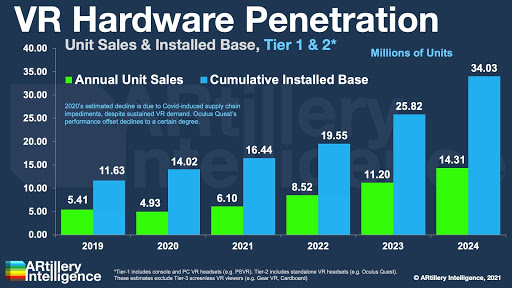Michael Boland
More posts from Michael Boland
One of VR’s prospective revenue streams is ad placement. The thought is that its levels of immersion can engender high engagement with various flavors of display ads. Think billboards in a virtual streetscape or sporting venue. Art imitates life, and all that.
This topic reemerged recently in the wake of Facebook’s experimental ads in Blaston VR. As TechCrunch’s Lucas Matney observed, it didn’t go too well. The move triggered a resounding backlash, followed by the game publisher, Resolution Games, backing out of the trial.
This chain of events underscored Facebook’s headwinds in VR ad monetization, which stem from its broader ad issues. In fairness, this was an experimental move to test the VR advertising waters … which Facebook accomplished, though it didn’t get the result it wanted.
Regardless, we’ve taken this opportunity to revisit our ongoing analysis and market sizing of VR advertising in general. The short version: There are pros and cons on both qualitative and quantitative levels.
The pros of VR advertising
VR advertising’s opportunity goes back to factors noted above: potentially high ad engagement given inherent levels of immersion. On that measure, VR exceeds all other media, which can mean higher-quality impressions, brand recall and other common display-ad metrics.
Historical evidence also suggests that VR could follow a path toward ad monetization. VR shows similar patterns to media that were increasingly ad supported as they matured. These include video, social media, mobile apps and games (just ask Unity).
To put some numbers behind that, 75% of apps in the Apple App Store’s first year were paid apps — similar to VR today. That figure declined to 15% in 2014 and hovers around 10% today. Over time, developers learned they could reach scale through free downloads.
Prevalent revenue models today include in-app purchases — especially in mobile gaming — and advertising. The question is whether VR will follow a similar path as developers learn that they can reach scale faster through free apps that employ “back-end monetization” like ad support.
This trend also follows audience dynamics: Early adopters are more likely to pay for content and experiences. But as a given technology or media matures, its transition to mainstream audiences requires different business models with less upfront commitment and friction.
“Today, there are only about 18% of applications in VR stores such as Steam and Oculus that are free,” Admix CEO Samuel Huber said. “This is fine for now because we are still very early in the market and most of these users are early adopters. They are willing to pay for content, just like they were willing to pay for prototype unproven hardware and generally, they have higher purchasing power than the average person.”
Drawbacks of VR advertising
Considering the above advantages, VR advertising is a bit of a double-edged sword (or beat saber). Those advantages are counterbalanced by a few practical disadvantages in the medium’s early stage. Much of this comes down to the requirement for scale.
VR’s consumer penetration is far from where it needs to be to attract the famously reach-driven Madison Avenue en masse. For example, VR’s current installed base of 16 million headsets is equivalent to less than 1% of the global smartphone installed base.
Drilling down to more applicable figures for VR advertising, it’s a matter of impressions that any one app or game can expect. Though there are outliers like Beat Saber that have a few million users, most games reach monthly active user bases in the thousands or tens of thousands.
This effectively precludes any meaningful ad revenue. To break this down, standard CPM (cost per thousand) rates for online display ads vary wildly but are generally between $1 and $3 across Google’s display ad network. Emerging and high-performance media tend to fetch higher CPMs.
So let’s say generously and for the sake of argument that VR ad CPMs average $15. Let’s also say that you’re a game publisher that has 10,000 active users, each of whom experiences 10 ad impressions per month. Congratulations: You’ve just made $12,600 in annual ad revenue.
Of course, mileage will vary and you can play with the formula inputs above. Keep in mind that CPM is cost per 1,000 impressions and the 30% hit is ad-network revenue share (e.g., Facebook’s cut). Bottom line: VR usage needs more scale before ad revenue makes a dent.

When considering the opposing arguments, they’re both right, though they’re separated by time. The optimistic viewpoint is accurate for the long term, while the scale-driven pessimistic view reflects today’s reality — at least for the majority of VR apps.
The above ad revenue exercise is also framed in today’s ad market standards. Advertisers will want to buy ads and evaluate ROI in CPM terms, but VR will eventually need native metrics (like AR) that capture its depth of engagement. It shouldn’t be measured like a pre-roll video ad.
Beyond metrics, ad units themselves will evolve. Much of the above is framed in terms of display ads that players encounter in VR gameplay. But we’ll see higher-value formats develop that involve deeper levels of organic in-game interaction with a given brand’s products (like this).
Lastly, just like the historical evolution of media revenue models, we’ll see a combination of approaches. Though mobile apps trended toward ad support over time, there’s still room for premium apps that people pay for — just like we see in console gaming and entertainment today.
The point is that consumers will have a choice to pay through dollars or ad exposure. VR developers will likewise have a choice in business models, as with mobile apps. But it could take several years for VR usage to reach requisite levels for meaningful ad monetization.
Automakers, suppliers and startups see growing market for in-vehicle AR/VR applications































Comment